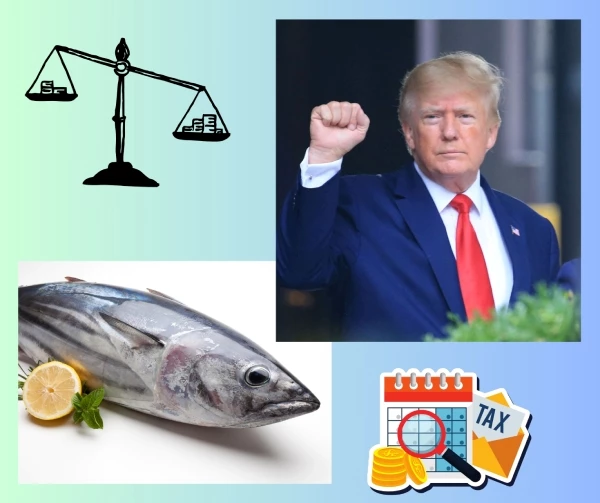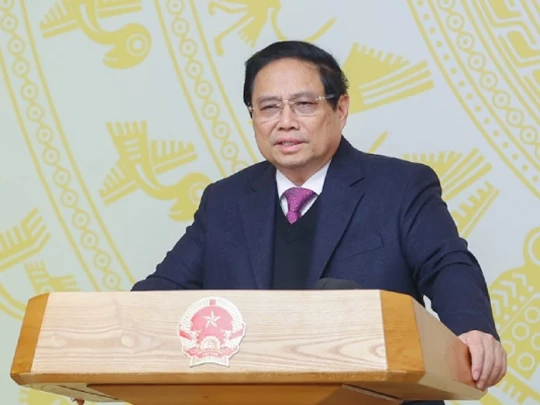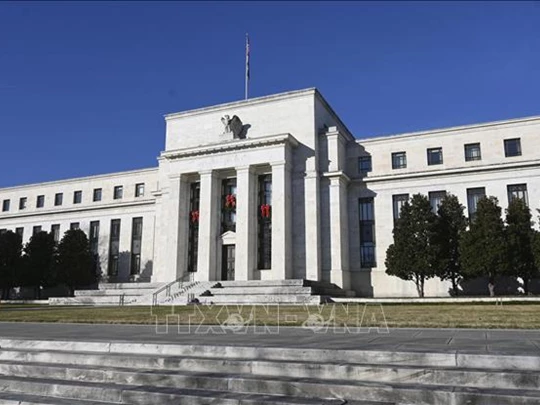DNVN - Immediately after taking office, US President Donald Trump signed an executive order imposing tariffs on all imported goods from the US's three largest trading partners. The increase in import tariffs has forced US importers to seek alternative sources of supply with more competitive prices, including Vietnam.
Tuna export trends to the US
According to data from the Vietnam Association of Seafood Exporters and Producers (VASEP), in 2024, the Vietnamese tuna industry reached an impressive finish line with an export turnover of 989 million USD, an increase of 17% compared to 2023. Among tuna export markets, the US is the largest importer of Vietnamese tuna, accounting for more than 39% of total export turnover.
Therefore, businesses are very concerned about trade policies, especially the tariffs that the Trump administration may apply to countries that have large trade deficits with the US, including Vietnam.
According to statistics from the International Trade Center (ITC), Vietnam is the second largest source of tuna for the US market after Thailand. During his first term, Donald Trump increased import tariffs on tuna products imported from China to 10% and in 2019 to 25%.

The increase in import tariffs has forced US importers to seek alternative sources of supply with more competitive prices, including Vietnam.
At that time, China was one of the five main tuna suppliers to the US market. In particular, this country was holding the majority of the market share in the US HS16 frozen steamed tuna loin market segment, due to the low price of its products.
The increase in import tariffs has forced US importers to seek alternative sources of supply with more competitive prices, including Vietnam. The value of Vietnam's tuna exports to this market has tended to increase rapidly. Although in the following years, Vietnam's tuna exports to the US were strongly affected by the COVID-19 pandemic and the economic crisis, the export turnover in 2024 still increased by 72% compared to 8 years ago.
Opportunities for Vietnamese tuna
In 2024, Vietnam's tuna exports to the US will grow continuously. Last year, while Vietnam's frozen tuna meat/loin exports to the US tended to grow continuously, processed and canned tuna exports were unstable and tended to decrease, especially in the second half of the year.
In the canned tuna market segment, Vietnam is the third largest supplier after Thailand and Mexico. Over the past year, the US has tended to reduce imports from Mexico and increase imports from Vietnam. Especially with canned tuna products for the food service segment, Vietnam has surpassed China to become the largest supplier to the US market.
In the US frozen tuna meat/loin segment (HS030487), Vietnam is the second largest supplier after Indonesia and before Thailand. US imports of this product group from Thailand are decreasing, while imports from Vietnam and Indonesia are increasing.
On the first day of February 2025, shortly after taking office, US President Donald Trump signed an executive order imposing tariffs on all imported goods from the US's three largest trading partners: China, Canada, and Mexico. The executive order signed by Mr. Trump imposes an additional 10% tax on Chinese goods, effective from February 4, and 25% on goods from Mexico and Canada, which is currently suspended for 30 days.
According to Ms. Nguyen Ha - a tuna market expert of VASEP, this decision of Mr. Trump is expected to affect the price of canned tuna in the US. The purchasing power of American consumers may be affected because retailers may have to increase product prices.
But it is worth noting that canned skipjack tuna imported into the US is subject to tariffs ranging from 12.5% to 35%, unless a country has an agreement to enjoy preferential or reduced tariffs when exporting to this market.
The US-Mexico-Canada Trade Agreement (USMCA), signed by Mr. Trump in 2020, is still in effect, allowing Mexico and Canada to enjoy preferential tariffs on many products, including tuna. Therefore, if negotiations with Mexico and Canada fail, tuna products from these two countries, especially Mexico, to the US will decline.
Similarly, in the case of China, its tuna exports to the US will also be strongly impacted after being imposed with additional tariffs.
According to the analysis of Mr. Pham Quang Vinh - Former Deputy Minister of Foreign Affairs, Former Ambassador of Vietnam to the US, the trade deficit between Vietnam and the US is an objective mutual issue in trade between economies. If the US restricts China, it will of course have to increase imports from other countries, in which Vietnam is a country with competitive advantages. Therefore, this will be an opportunity for Vietnamese enterprises to penetrate deeper into the US tuna market.
Minh Thu
Source: https://doanhnghiepvn.vn/kinh-te/phan-tich/thue-quan-moi-cua-my-tac-dong-the-nao-toi-ca-ngu-viet-nam/20250211100914447




























































Comment (0)